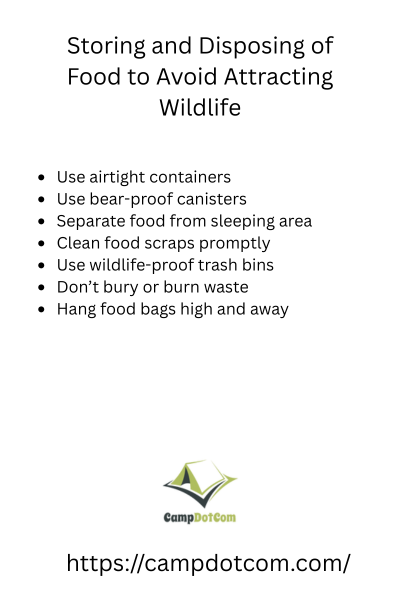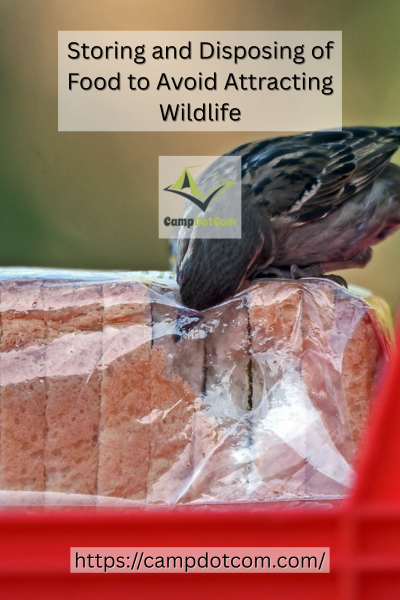Let’s talk about something that can make or break your camping trip: storing and disposing of food to avoid attracting wildlife.
Sounds simple, right? But trust me, one wrong move with your trail mix or leftover chili and you might wake up to raccoons throwing a party—or worse, a bear rummaging through your gear like it’s a buffet.
Read More About Storing and Disposing of Food to Avoid Attracting Wildlife

I Learned the Hard Way (So You Don’t Have To)
I will never forget a trip I took to the Smokies a few years ago. My friend and I thought we were being careful. We tucked our snacks into a zippered tent pocket and tossed our food scraps into the fire pit before heading to bed.
As an Amazon Associate, I earn from qualifying purchases. Some of the links in this article are affiliate links. This means that, at zero cost to you, I will earn an affiliate commission if you click through the link and finalize a purchase.
That turned out to be a big mistake.
At around two in the morning, we woke to the sound of snorting and shuffling. A curious black bear had sniffed out our so called hidden granola bars. As it turns out, zippers are no match for bears.
We spent the rest of the night wide eyed, clutching our headlamps like they were lightsabers.
The lesson we learned was that storing and disposing of food to avoid attracting wildlife is not just about keeping things neat. It is also about staying safe and protecting the animals.
More Things to Know About Storing and Disposing of Food to Avoid Attracting Wildlife

Why It Matters (Even If You Don’t See Animals)
Even if you have never had an unexpected animal guest during a camping trip, wildlife is always nearby. Many animals have an incredible sense of smell. For example, some bears can detect food from more than a mile away.
When food is left out and unprotected, it is like sending an open invitation for them to come into your campsite. It also teaches them to associate people with food, which can be dangerous for both animals and humans.
And it is not only bears you need to think about. Raccoons, skunks, foxes, coyotes, and even squirrels can all turn into sneaky food thieves.
Smart Storage: Keeping Food Safe and Scent-Free
When it comes to storing and disposing of food to avoid attracting wildlife, your first goal is keeping smells contained.
Here’s what works:
- Use bear-proof containers or canisters: They’re not just for backpackers anymore. Many car campers are using them now too—and for good reason.
- Store food well away from your tent: Ideally, at least 100 feet. If you’re in bear country, hang your food or use a bear locker if provided.
- Keep everything scented—food, trash, toothpaste, deodorant—in one secure place.
- Never bring food into your tent: Not even “just for a minute.” Trust me, it’s not worth it.
You might be surprised how many times I’ve heard people say, “But it’s sealed!” when talking about leaving snacks in the tent. Bears don’t care. If it smells like food, it is food.
Disposing of Food: Not Just Toss and Go
Now for the second half of the equation: disposing of food to avoid attracting wildlife.
Tossing scraps into the bushes might feel “natural,” but it’s a bad idea. Wildlife doesn’t know the difference between a food wrapper and a leftover taco. They’ll eat both—and keep coming back for more.
Here’s what I do:
- Pack out all food waste: Yes, even the gross stuff. Bring extra bags and double-bag anything that leaks or stinks.
- Don’t bury food: It might seem like a tidy solution, but animals can dig. You’re basically planting a snack.
- Burning food?: Only if it’s minimal and your fire is hot enough to reduce it to ash. Even then, I still pack most of it out.
– Use designated trash containers if they’re available—especially in developed campgrounds. Don’t assume someone else will deal with your mess.
What About Gray Water?
If you are washing dishes, be sure to strain out any food bits and take them with the rest of your trash. Pour the strained water away from your campsite, at least 200 feet from any lake, river, or stream.
Animals are curious about anything that smells like food, even dishwater with soap, so it is best to keep it clean and keep it far away.
Picture This: A Wild-Free, Peaceful Night
Imagine sitting by the campfire, your belly full, your gear secure, and no critters crashing your party. You can fall asleep knowing you’ve done everything right when it comes to storing and disposing of food to avoid attracting wildlife.
Not only are you keeping your camp safe, but you’re helping keep animals wild—which is exactly how it should be.
Protect Nature and Your Gear with Smart Food Storage
Let’s be honest, nobody wants to be the camper who accidentally invites a bear over. Or the one who wakes up to find chipmunks gnawing through their backpack. Just one small mistake can create a wildlife problem that continues long after you have packed up and left.
The main point to remember is this: storing and disposing of food to keep wildlife away is not optional. It is an important part of being a responsible camper.
You do not need special equipment or years of camping experience. All it takes is a little common sense, some preparation, and perhaps a bear canister that does not still smell like last weekend’s chili.
Enjoy your camping trip, and may your snacks stay safe and your nights remain calm.
